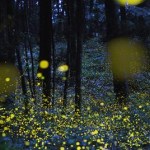glow
Jeff Cremer, a nature photographer, discovered mysterious tiny glow worms (~0.5 inches long) in Peru near the Tambopata Research Center a couple of years ago. Scientists still have not identified the species of these glow "worms", but suspect they are actually click beetle larvae. Entomologists Aaron Pomerantz, Mike Bentley, and Geoff Gallice from the University of Florida decided to go to Peru to investigate the worms. Here is what they found:
"Building one space station for everyone was and is insane: we should have built a dozen." -Larry Niven
Here on the solid ground of the Earth, the Sun and Moon rise and set on a daily basis. During the hours where the Sun is invisible, blocked by the solid Earth, the stars twirl overhead in the great canopy of the night sky.
Image credit: Chris Luckhardt at flickr.
In the northern hemisphere, they appear to rotate around the North Star, while in the southern hemisphere, the stars appear to rotate about the South Celestial Pole. The longer you observe -- or for photography, the longer you…
It will shine still brighter when night is about you. May it be a light for you in dark places, when all other lights go out. -J.R.R. Tolkien
The night sky is no stranger to most of you. Once the Sun goes down in the west, the sky darkens, turning ever-deeper shades of blue until it approaches blackness, and stars and planets begin to come out against the fading backdrop.
Many things pollute the darkening sky, and can obscure your vision of the dimmest objects in the sky. Getting away from the city and light pollution is important, as is having clear skies without too many clouds in them.…
As you read this, you are glowing - weakly, faintly, but glowing nonetheless. Chemical reactions within your body, besides liberating energy and producing heat, are also emitting small numbers of photons, elementary particles of light. The glow is strongest in the late afternoon, and around the lower part of your face.
Many living creatures, including fireflies, jellyfish, squid, glow-worms and deep-sea fish, are known for producing their own light often through the help of bacterial accomplices. But virtually all living things emit some degree of light, albeit so weakly that it's very hard…


